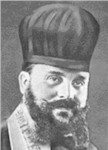
David Roitman (1884-1943) Rochel M’vako al Boneho
Cantor Rebecca Carmi, Soprano
National Opera Orchestra
Joseph Ness, Conductor
DAVID ROITMAN (1884-1943)—ROCHEL M’VAKO AL BONEHO
The city of Vilna enjoyed such a pronounced Jewish presence that when Napoleon stopped there in 1812 during
his retreat from Moscow, he reportedly named it “The Jerusalem of Lithuania.” Its Great Synagogue, dating from 1633,
conformed to a regulation that it rise no higher than surrounding buildings. So it did, when viewed from the outside. But
being built into the ground, its interior height was beyond belief. Its vaulted ceiling seemed to rise along with the fame of
its cantors, each of who bore the title shtodt khazn [City Cantor].
David Roitman, the most intellectually inclined of them all, composed not only a complete liturgical cycle, but
also a comprehensive repertoire of songs—many of which like Rochel M’vako al Boneho—have become classics. From
listening to klezmer music as a child in the Ukraine, he developed an uncanny ability to replicate the limpid soft tone of a
clarinet, a skill he transferred into the pleading mezza voce [half-voice] that became his calling card. He was also one of
the few world-class cantors who attended the Leningrad Music Conservatory. David Roitman’s introspective, selfabasingly
plaintive style perfectly suited the text of this song:
Thus says the Lord: A cry is heard in Ramah...
Rachel weeps for her children who are gone...
From God’s exalted dwelling a voice of weeping goes forth...
The Lord of Hosts called for the wearing of sackcloth...
For these things I weep... My children are in misery…
The valiant cry mightily without,
The angels of peace weep bitterly.
Jeremiah 31: 1-5, 25: 30 | Isaiah 20: 12 | Lamentations 1: 16 | Isaiah 33: 7